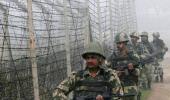'If the US-Pakistan relationship continues to suffer, Pakistan may feel it has less to lose and decide that it need not keep a leash on LeT in order to appease America.'
'A tougher US policy toward Pakistan could lead to an emboldened and strengthened LeT and JeM, resulting in more terrorist attacks in India.'
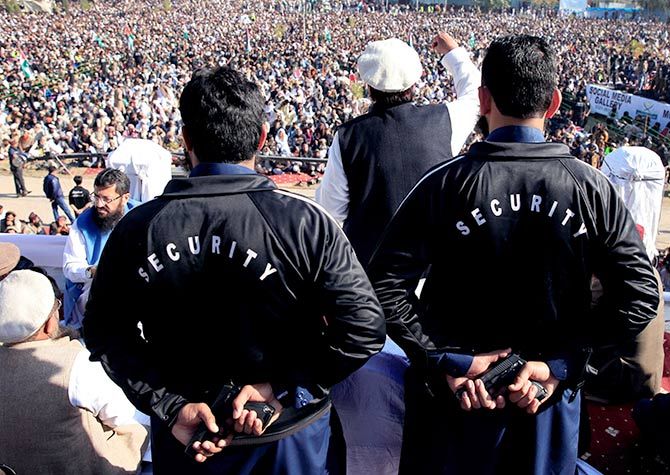
IMAGE: Muhammed Saeed, the Lashkar-e-Tayiba terrorist, addresses supporters at a protest in Rawalpindi, December 29, 2017, against the US decision to recognise Jerusalem as Israel's capital. Photograph: Faisal Mahmood/Reuters
Is the United States serious about withholding military aid worth over $1 billion to Pakistan?
Or is this mere sabre-rattling by the Donald J Trump administration, before business returns to usual in the weeks to come?
To understand the complexities involved, Rediff.com spoke to Michael Kugelman, deputy director and senior associate for the South Asia programme at the Wilson Centre, the Washington, DC-based think-tank.
In the first part of an e-mail interview with Nikhil Lakshman, Michael explained the US' concerns were the Afghan Taliban and the Haqqani Network who attack US soldiers in Afghanistan, and not the Lashkar-e-Tayiba or Jaish-e-Mohammed which targets Indian soldiers and civilians in Jammu and Kashmir.
Will the Trump administration's decision help India in any way? Will the US action drawn Islamabad further into Beijing's embrace? Find out what Michael thinks in the concluding part of the interview:
- Part 1 of the interview: 'US wants Haqqanis, not Saeed'
Does the Trump administration's decision on Pakistan help India in any way? Beyond emphasising in a way India's position in America's strategic doctrine?
The aid freeze is certainly a short-term net gain for New Delhi, as it's a case of India's American friend penalising its Pakistani foe.
Additionally, India is well aware that one of Pakistan's strategic goals has long been for the US to treat Pakistan the same way that it treats India.
The aid freeze underscores how the US-Pakistan relationship is going south while the US-India relationship continues to strengthen, thereby undercutting one of Pakistan's core strategic goals.
This is all music to India's ears.
It's too early to tell if the decision will help India.
As I've said, the aid freeze will not magically make Pakistan sever its ties to terrorists. How much the decision ends up helping India depends on what steps both the US and Pakistan take next.
If the US opts to increase the pressure on Pakistan, it may well try to help India's own capacities for targeting terrorist threats in Pakistan.
This means, in due course, that Washington may be willing to sell India drone technology -- initially surveillance drones, but perhaps eventually lethal drones.
Such technologies would increase India's abilities to target terrorists across the border.
Ironically, however, an aid freeze, if it does signify a harder US line with Pakistan and leads to even harsher US measures, could actually cause major problems for India.
If Pakistan feels sufficiently provoked by American pressure, it may well tighten rather than loosen its embrace of terrorists.
If the US-Pakistan relationship continues to suffer and if the US keeps tightening the screws, Pakistan may feel it has less to lose and decide that it need not keep a leash on LeT in order to appease America.
In effect, a tougher US policy toward Pakistan could conceivably backfire and lead to an emboldened and strengthened LeT and JeM, resulting in more terrorist attacks in India.
There's a difference in opinion among analysts as to how Pakistan would react if the US implements punitive measures.
Some think Pakistan, realising that their selective policy toward terror is no longer tenable, would cave to US demands.
Others think it would simply grow more emboldened and double down.
Ultimately, it all comes down to what conditions would need to be in place for Pakistan to conclude that the costs of maintaining -- much less increasing -- ties to militants are too high.
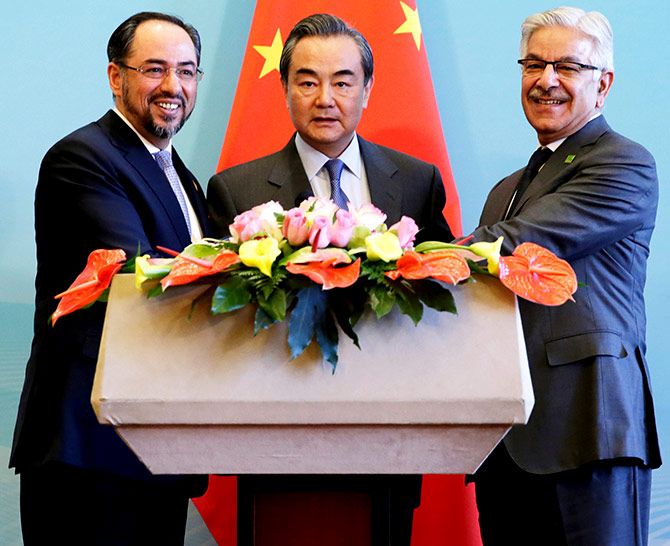
IMAGE: Afghan Foreign Minister Salahuddin Rabbani, Chinese Foreign Minister Wang Yi and Pakistan Foreign Minister Khawaja Asif at a news conference after the 1st China-Afghanistan-Pakistan foreign ministers' dialogue in Beijing, December 26, 2017. Photograph: Jason Lee/Reuters
Are the Pentagon and State Department not concerned that this decision could drive the Pakistanis into China's embrace?
Or do they are believe that that is a done deal, and there is no point worrying about Islamabad's proximity to Beijing?
Will this in any way queer the US plans in Afghanistan considering Beijing's overtures to Kabul?
My sense is that the US government acknowledges that the China-Pakistan relationship, fueled by the China-Pakistan Economic Corridor and a shared Indian enemy -- particularly as Beijing's relations with New Delhi have worsened significantly over the last year -- is going to be strong no matter what.
In effect, Washington understands that the Pakistanis have already been driven into China's embrace.
Washington likely also understands that this ever-deepening China-Pakistan partnership has deleterious strategic consequences for the United States, as America's biggest strategic competitor is deepening its footprint in a country where the US is losing more credibility and influence by the day.
At the same time, I don't think the US government views this all as a net loss.
Even with China getting closer to Pakistan while America may be backing away, there are still ample convergences in interests between the US and China in Pakistan and in the broader Afghanistan-Pakistan region.
First off, China wants the terrorism problem to go away in Pakistan as much as the US does.
It may not say so publicly, but I'm sure it worries about the presence in Pakistan of the Haqqanis, LeT, JeM, and their ilk, because even if they don't stage attacks in Pakistan, they are still terror groups and are thus inherently unstable.
And with China deeply invested in Pakistan because of the CPEC (China Pakistan Economic Corridor), it will want conditions on the ground that maximise the chances for stability.
Beijing has a similar view about Afghanistan, where it also has many economic interests at stake.
So in effect, for all this talk of Pakistan running into the embrace of China and leaving America in the lurch, I'd argue that the US and China will continue to see eye-to-eye on a number of issues in the region -- even if they don't admit as much publicly.
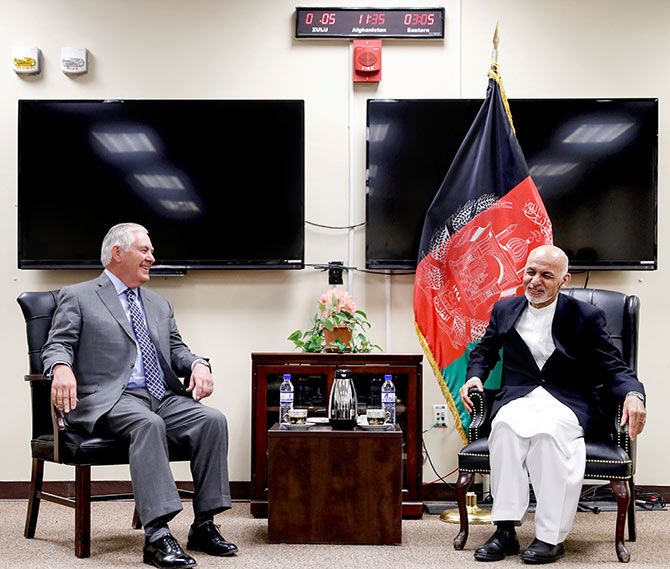
IMAGE: US Secretary of State Rex Tillerson, left, with Afghan President Ashraf Ghani at a meeting at Bagram air field, Afghanistan, October 23, 2017. Photograph:Alex Brandon/Pool/Reuters
Where do you see the Afghan situation heading this year?
Is this a decisive year for the pro-American government in Kabul?
It seems like every year for the last 17 years has been described as a pivotal year for Afghanistan.
2018 will be no exception, and for several reasons.
First, this year we'll see what type of impact Trump's Afghanistan strategy will have on the ground.
We'll see if the White House's decision to ramp up the fight against the Taliban -- through more troops, more stepped-up battlefield activities, and more flexible rules of engagement for US troops -- can turn the tide in the war.
The Trump administration hopes that intensifying the war on the Taliban will put the group on the defensive and make it amenable to a reconciliation process to end the war.
I'm fairly sceptical about this plan, given that the Obama administration tried something very similar, with many more troops, back in 2010 and 2011 -- and it failed.
Second, this is a big political year for Afghanistan.
It's scheduled to hold parliamentary elections that many people expect won't happen for security reasons and given that the country has fallen so far behind with the preparations.
If the elections don't happen, that will raise fears that presidential elections scheduled for 2019 will either not happen or be delayed.
And if you want to talk about a nightmare scenario, it's a situation where a highly destabilised country with a very unpopular government fails to hold an election.
So 2018 could go a long way toward determining Afghanistan's future political trajectory.
No matter how you slice it, Afghanistan's security situation is deeply troubled.
The Taliban controls or has influence in more areas of the country than it has at any time since 2001.
The writ of the Afghan State doesn't apply in many areas outside of Kabul, meaning that pro-government militias and the Taliban often compete for the right to hold a monopoly on security.
This is a recipe for big-time instability.
Though the US government publicly praises Afghanistan for its very real progress in security -- and there has been progress, particularly as seen through a better-trained Afghan military -- it surely knows that the situation on the ground is quite grim.
It's quite telling that top US officials often meet Afghan interlocutors on military bases, not in downtown Kabul, and that in many cases their visits are not announced in advance, and when they arrive, they come in the middle of the night.
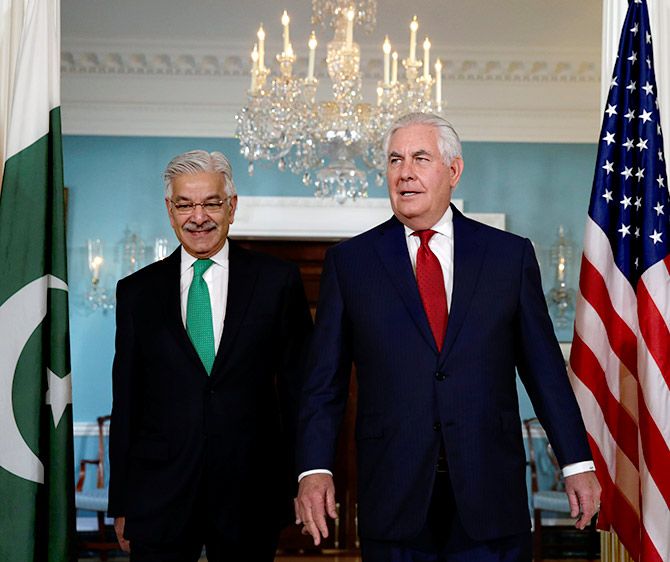
IMAGE: US Secretary of State Rex Tillerson, right, with Pakistan Foreign Minister Khawaja Muhammad Asif at the State Department, Washington, DC, October 4, 2017. Photograph: Yuri Gripas/Reuters
Where do you see the current US-Pakistan standoff playing out?
What will Islamabad have to do to repair relations with Washington?
Do you think the Pakistanis will be willing to do so?
Or do the generals believe they hold the aces and the Americans will make amends before long?
The trajectory of the US-Pakistan relationship depends on what America does next, and how or if Pakistan responds.
If the US quietly walks back all the threats of punitive actions, then the relationship will return to its typical status of uneasy coexistence.
But if the US does decide to take harsh measures -- revoking Pakistan's non-NATO ally status, sanctioning individual Pakistani military officials, expanding drone strikes, staging unilateral raids into Pakistan, pressuring international financial institutions to stop sending loans to Pakistan -- then the relationship could face a major crisis.
And if the Pakistanis retaliate -- and their best options would be to suspend the NATO supply lines and cut off all intelligence cooperation with Washington -- then there would be a full-blown and perhaps even unprecedented crisis in relations.
If history is any guide, we can expect Pakistan to try to take some one-off, token, measures meant to appease the Americans.
This could entail arresting some high-level Haqqani Network leader, or closing down some type of Taliban facility in Baluchistan, without actually cutting off support for these terrorists on the whole.
Pakistan's objective here would be to do the least amount necessary in order to ease US pressure.
This has worked for Pakistan in the past, but the question is whether a Trump administration that, at least rhetorically, is tougher than its predecessors would settle for such modest gestures.
The Pakistani military has traditionally done a good job of playing the Americans and convincing them that they're doing things they're not.
Trump himself is someone who can be played, but I doubt that some of his top deputies -- such as (National Security Adviser General) H R McMaster or (Defence Secretary General) James Mattis -- would be easily fooled.
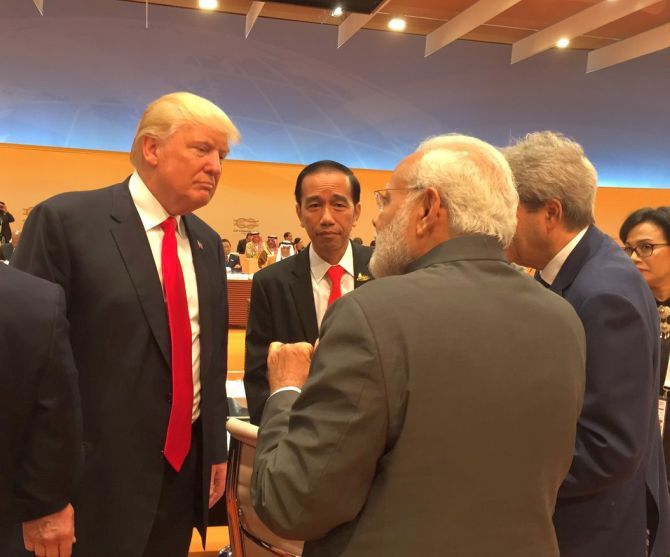
IMAGE: Prime Minister Narendra D Modi chats with US President Donald J Trump at the G-20 summit in Hamburg, July 8, 2017. Photograph: Kind courtesy Arvind Panagariya
And how do you think all this affects the India-US relationship? Do you see it being further strengthened this year? In what way?
The India-US relationship is in a very good place, and it's only going to get better.
The sky truly is the limit.
Yes, there are some tension points, particularly the H1B visa issue, and some of Trump's rhetoric -- such as his bizarre comments about India's use of climate change assistance -- have understandably rubbed New Delhi the wrong way.
Still, there are strong, fundamental strategic convergences -- particularly in terms of how each country is concerned about China and how each country views the threat of terrorism.
Also, while Trump and Modi may never enjoy the personal camraderie that prevailed under Obama and Modi, Trump and Modi did seem to hit it off well when they met last year.
Also, they share many similarities -- from their business backgrounds and conservative politics to their troubled relationships with the media (coupled with a strong embrace of social media).
Cascading US-Pakistan tensions will only make the US-India relationship grow more.
The US's historical preference for a workable relationship with the Pakistani army has long been a sore spot in US-India relations.
If the US really puts the squeeze on Pakistan -- such as by sanctioning Pakistani military officials -- then that will score many points in Delhi.
Also, the worse the US-Pakistan relationship gets, then the less the US will feel it has to lose and the more likely it will be to take new measures to help India defend itself from terror threats -- measures that could include working out deals to send drone technology to India.
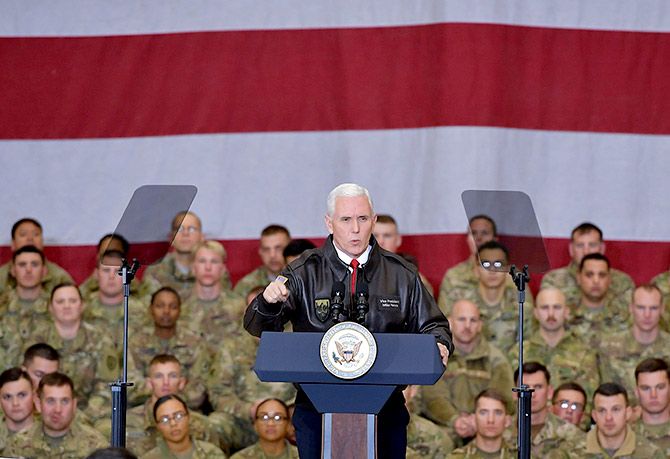
IMAGE: US Vice President Mike Pence speaks to American troops in a hangar at Bagram air field, Afghanistan, December 21, 2017. Photograph: Mandel Nga/Pool/Reuters
Finally, how will President Trump's troubles at home affect America's gambits in South Asia?
If he is forced out of office, will President Pence be as much of a hardliner towards Islamic terrorism as President Trump?
This is an important point. Because for all the talk about US policy in Pakistan in recent days, Pakistan and broader South Asia (with the exception of relations with India) are not major policy priorities for the Trump White House.
Pakistan could easily fall off the White House's radar once the dust settles from the events of recent days, and especially because of all its domestic distractions.
The various scandals engulfing the White House mean that the policy space for foreign policy is shrinking, and those foreign policy issues that don't rank high on the hierarchy certainly won't get much attention.
All this said, it seems hard to imagine that Trump would be forced out of office before the end of his term, unless the Democrats retake the House in this year's Congressional elections and somehow manage to quickly launch and successfully conclude impeachment proceedings.
There are many big 'ifs' here. Still, if we suspend our disbelief and consider the possibility of a President Pence, then I don't think there would be much difference on Pakistan policy than there's been with Trump.
The president has let his advisors guide the policy. Pence, based on his own speeches and other public statements, appears to favor the same hard line that Trump's advisors do.
One thing that would be different, however, is the predictability factor.
Pence gives the impression of someone who would act more like a conventional US president, meaning fewer bombastic rhetoric and truculent tweets and more consistent and disciplined positions.
It would likely be easier for difficult relationships, like the US-Pakistan one, to work problems out when there's a less mercurial person occupying the White House.


